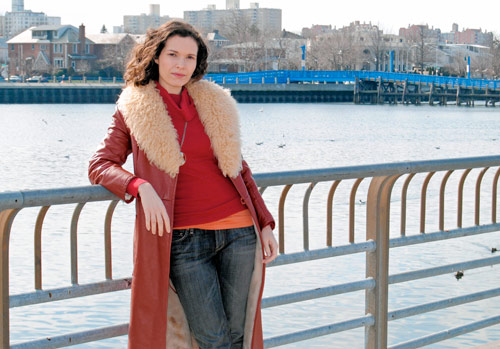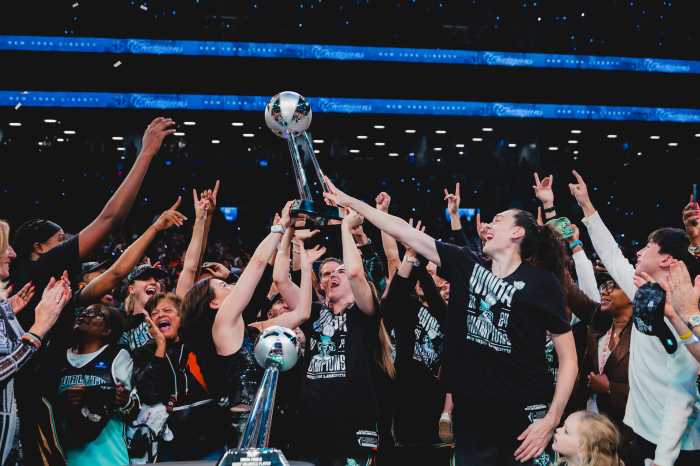Sheepshead Bay takes center stage — literally — in Brooklyn native Erika Sheffer’s off-Broadway debut, “Russian Transport,” starring comedian Janeane Garofalo, about a Russian American family from the neighborhood struggling to make ends meet, whose daily routine is upended by a surprise visit from a trouble-making relative named Boris.
We caught up with Sheffer, a Flatbush resident and graduate of Edward R. Murrow High School, to discuss the drama, immigrant life in Brooklyn and her upcoming play, set in Midwood.
Daniel Bush: Why did you set “Russian Transport” in Sheepshead Bay, as opposed to Brighton Beach? What is it about Sheepshead Bay in general, and Russian immigrants in particular, that you find so interesting?
Erika Sheffer: My parents and brother emigrated from the Soviet Union in 1975. We first lived in Boro Park, but moved to the Sheepshead Bay–Marine Park area when I was five. As a kid, I remember going to Brighton Beach and feeling like I’d wandered into another country. A Russian immigrant could live there and never have to learn English. Sheepshead Bay feels more diverse to me. Since the kids in the play are not totally immersed in Russian culture, their struggle to balance their parents’ values with their own assimilated point of view mirrored my own experience.
DB: The character played by Janeane Garofalo, Diana, and her husband Misha are struggling to maintain their small business. But their children seem more concerned with fitting into mainstream American culture. What does this generational divide say about the immigrant experience?
ES: When my parents came to America, they brought a lot of anxiety and fear with them. They wanted to make a better life for their children, but when that involved going away to college, moving to another state, or pursuing a less than lucrative career in the arts, fear of the unknown took hold. I’m lucky my parents supported me despite their fears. Like Diana and Misha, their focus was to ensure the safety of their children, but coming from an oppressive regime, their idea of what it meant to be safe is very different from the average American high schooler. The biggest difference I’ve found between my parents generation and mine, is that we expect to find happiness. They hope for stability.
DB: Would the play have been any different if you focused on Mexican immigrants in Sunset Park, say, or the growing Turkish community in Sheepshead Bay? Or do different immigrant groups share more things in common then we might assume?
ES: When you come to a new country, understanding its values is a battle you often lose. At least in the beginning. Personally, I can relate to that story whether the players are Chinese, Cuban, or Sudanese. We all come here wanting to fit in while retaining that which feels uniquely home. It’s a paradox that’s universal to immigrants. Except for the food and jewelry, I’d say we’re a pretty similar lot.
DB: You grew up in Brooklyn. Where were some of your favorite places to go as a child, and what do you do for fun now?
ES: When I was a kid, the biggest treat was a trip to Nellie Bly. You can’t even call that place an amusement park. It’s off Shore Parkway and they used to give you a dirty potato sack to wear when you went down the “Fun Slide,” so you could gather momentum and sustain more lasting injuries. Caesar’s Bay Bazar was another classic trip. Now it’s just a big chain mini-mall, but back in the day, it was filled with independent vendors selling everything you could think of. You could buy a carpet from the middle east and a snow cone in one location.
Nowadays, there is always something amazing happening at BAM or St. Anne’s Warehouse. Also, don’t leave this borough without eating at L&B Spumoni Gardens, Brennan & Carr, and my local falafel cart on Cortelyou Road.
DB: Will your next play be set in the borough, too?
ES: Well, I’ve got two in the works and one is indeed set in Brooklyn. We’re moving north to Midwood, this time.
“Russian Transport” at the Acorn Theater [W. 42nd St. between Ninth and Tenth avenues in Manhattan (212) 239-6200] on Mondays–Wednesdays at 8 pm, Thursday–Friday at 8 pm and Saturdays at 2 pm and 8 pm, through March 24. Tickets start at $61. For more info visit www.thenewgroup.org.

























